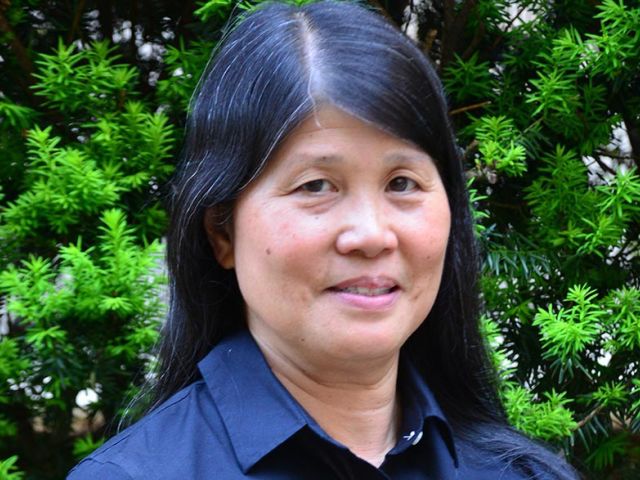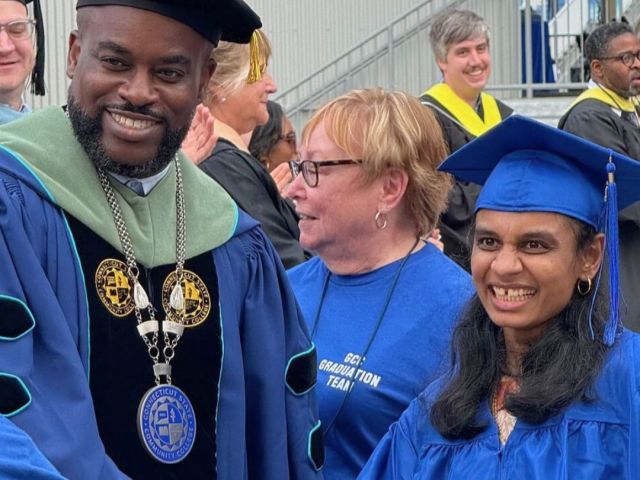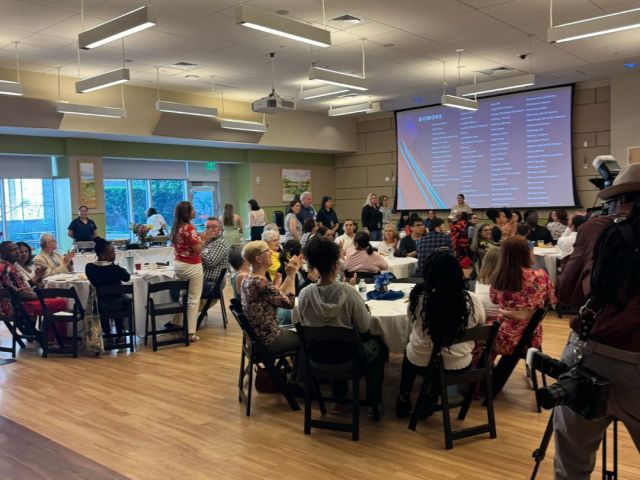News Center
Bringing you the latest news and events from Gateway Community College.
Renowned Railroad Program Draws Out-of-State Students to GCC
Share
Gateway's Railroad Engineering Technology (RET) program is on track for nationwide success, and now a pilot program offers a dorming option for out-of-state students.
For young people embarking on what they hope will be a challenging and rewarding career path, that advice may seem axiomatic. But working on the railroad?
Yes, indeed. Through its Railroad Engineering Technology (RET) program, Gateway offers an Associate in Science degree pathway to nearly 100 students (as of fall 2017) who have their sights set on lucrative, long-term careers in the passenger and freight rail industry — a traditional (if lately sometimes overlooked) cornerstone of the nation’s transportation infrastructure.
Launched in 2013 with input from rail-industry professionals, the program offers transferable college credit courses in pneumatics, hydraulics, motor controls, electronics, electricity, HVAC, radio communications, radio signaling, computer maintenance and safety. Offering two academic tracks (Electromechanical and Signaling & Communications), the GCC program is unique to the Northeast.
The Gateway program actually traces its roots to 2010, when the U.S. rail industry was confronted with a massive wave of impending retirements on the part of a domestic employment base dominated for decades by baby-boom workers now nearing the twilight of their working lives. That was the year MTA Metro-North, which operates the nation’s largest commuter rail system, queried GCC officials about developing a new curriculum specifically to train new workers for the rail industry.
“Not only were they looking to replace the retiring workforce, but they also wanted to replace it with a different skill set than their [then-] current workforce had,” recounts Gateway’s Rich Halkyard, who was tapped to head the new initiative. “So Metro-North, Amtrak and a few others came around a table with Gateway to brainstorm what the program should look like. They decided to focus on two avenues — training electromechanical workers and signaling and communications workers.”
Those parallel tracks became the foundation of the Gateway RET program. The Electromechanical program prepares students for technical careers for which electromechanical knowledge and skills are a prerequisite. These include the maintenance and repair of railcars — a rapidly evolving career track as new technologies are introduced into rail cars.
The program’s Signaling & Communications track prepares students for employment in the repair and maintenance of railroad signaling and communications systems. As new communications technologies are continuously introduced to rail lines and railcars, successful job-seekers must possess the skills needed to navigate new technological challenges.
Halkyard notes that Gateway next year may add an Operations track for prospective locomotive engineers, conductors, yard masters and train dispatchers as well as other “support” workers that keep the industry rolling, he notes.
With a history stretching back nearly two centuries in the United States to Robert Fulton and the harnessing of steam power, rail transportation may seem anything but cutting-edge. Moreover, many of those who live and in the densely populated Northeast corridor associate rail transportation with ubiquitous commuter-rail lines such as Metro-North. Freight is something that barrels down I-95 on 18-wheel tractor-trailers doing 75 mph (when they’re not stuck in the Q Bridge backup).
The reality is far different — especially when one looks beyond southern New England. Nationwide, the rail industry is in many respects playing catch-up — both technologically and in employment terms. According to the Association of American Railroads, “Freight railroads alone will hire thousands of new employees to build teams of skilled, highly motivated [workers] to help safely transport materials and goods that sustain the nation’s economy and people.”
And that’s great news for young people like Jacob Correia, 18, of Taunton, Mass., seeking lucrative careers with long-term job security in a fast-paced industry aggressively seeking workers with skills for the long haul.
Trains, of course, are sometimes like catnip to kids who love all things transportation. And Correia is no exception. But unlike others, Jacob never left his love for trains behind. Now, thanks to Gateway’s RET program, he plans to forge a career from what began as a juvenile infatuation.
“Ever since I was a little kid I’ve been interested in trains,” explains Correia. “It really started when I was three or four and I saw my first train. One of my earliest memories is being in the back seat of my mom’s car and seeing a train go by. I thought, that is the coolest thing ever.”
Unlike starstruck young train-lovers of yore, Correia as he grew up stoked his rail jones with 21st-century technology tools such as digital locomotive-engineer simulators and his iPhone, which he uses to shoot train videos that he posts online. Under the user name GingerRailfan (a nod to his caboose-red locks) Correia has to date attracted some 700 YouTube followers.
Unlike most (though obviously not all) of his contemporaries, Correia never left trains behind as he grew toward adulthood. Instead, he began to explore how his railroad obsession might be transformed from youthful idyll to practical career path.
“Ever since high school I’ve wanted to find a [college] where I could get a degree in something that would help me get into the railroad [industry].”
Researching his options Correia searched in vain for pertinent course options at state schools in his native Bay State, but to no end. When he discovered the Gateway program online, Correia had met his match. Enrolling full-time in the RET program this fall, Correia was “absolutely hooked,” he reports. The curriculum “really gets in-depth regarding skills anyone who wants to work for the railroad, both freight and passenger, would need to learn.”
There was one hurdle to be cleared. New Haven is hardly commutable from Taunton, Mass., and as a community college Gateway lacks residential accommodations. But a new initiative on the part of the New England Board of Higher Education (NEBHE) affords non-resident students like Correia a reduced tuition rate to attend a Connecticut community college such as Gateway. In addition, non-resident students now have the option of living and boarding at nearby Southern Connecticut State University while attending classes at GCC. “This pilot program with Gateway and SCSU allows me to pay tuition to Gateway but get room and board [including] a meal plan” at Southern, he explains.
For Correia, studying at Gateway and living at Southern affords the best of both worlds. “This is definitely beneficial to anyone who wants to [enroll in] the railroad program because you get to learn all this stuff that will help you get the occupation you want with the railroad while at the same time living a campus life” embedded among some 10,000 SCSU students just three miles from GCC’s downtown campus.
“The Jacob Correia experiment is a great step forward for us because it opens up the program to a nationwide audience,” explains Halkyard. “I have six students now who are not from the state of Connecticut.” That, plus the reduced tuition rate for other (non-Connecticut) New England students through NEBHE holds bright promise for the RET program’s future, he adds.
Correia is pursuing the Signaling & Communications track, which for first-year students includes Computer Applications for Technology (CET 116) and History of Railroading (RET 101), prerequisites for both RET program tracks. Next semester he’ll take Railroad Rules, Regulations, Standards & Practices (RET 120) and, naturally, Careers in the Railroad (RET 110).
Of which there are more than one might think. And the most promising career path in rail transportation nationwide lies in freight, Halkyard explains. “The freight side actually makes more money, is more profitable and employs more workers than the passenger side,” he notes.
For Correia, his dream job in the rail industry is (no big surprise here) locomotive engineer. For one thing, “It’s a challenging job, and I like challenges. I’ve always been interested in the job, it makes great money [around $100,000 with ten years’ seniority, he estimates] — so why not?”
But with driverless automobiles just around the corner, isn’t he worried that train “driving” a la Casey Jones may soon become a thing of the past? “In other countries they already have driverless trains, and it won’t be long before America [has] that kind of technology,” Correia acknowledges. “But for long-distance freight and passenger trains, you will always need that human dimension for [rail traffic].”
Beyond that, both Halkyard and Correia see a bright future for the rail industry just around the bend as both environmental considerations and highway congestion come to dominate the public transportation conversation. Rail is already acknowledged to be the most “sustainable” mode of mass transit in terms of energy consumption and CO2 emissions. Moreover, “Without the railroad you’d be sitting in traffic for hours,” says Correia. “Trains are so essential to commuters, especially in metropolitan areas. Get rid of [trains] and everyone’s on the road now.”
Barely one semester into the program, Correia is enthusiastic about his chosen field of study — and confident he made the right decision. At the conclusion of his two year academic journey, he predicts, “It would be hard not to get a job on the railroad.” And his enthusiasm for the program is contagious — via YouTube and social media Correia has enthusiastically recommended it to adolescent rail buffs hoping to turn a boyish infatuation into a lucrative lifetime career. “I think this program is going to thrive a lot,” he predicts.
Halkyard sees a bright future for the RET program. Over its three years as a degree-conferring program “We’ve changed the program, we’ve expanded it and we’re going to keep expanding it,” he says. “It has a great reputation now in the railroad industry.” And Halkyard intends to keep that momentum solidly on the track.
For information contact Rich Halkyard, RET Program Coordinator, via e-mail at






